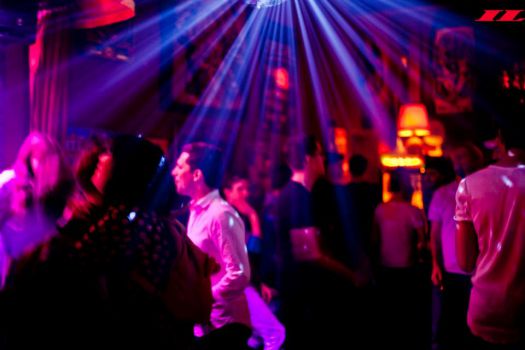McGill alumnus Gabriel Cholette (MA ‘17) started his writing career by publishing true vignette-style stories about queer sex and party culture on an anonymous Instagram account for his friends. The vignettes range in length from a single sentence to a three-page whirlwind, with settings from Montreal to Berlin, but all take place in the queer underground rave scene. Cholette wrote about these experiences from 2017 to 2018, as he was going to various clubs and parties. Since then, Cholette has taken ownership of his zesty prose and intriguing stories through the composure of his 2021 memoir Les Carnets de l’Underground. On Oct. 4, local Montreal publisher House of Anansi released an English edition—translated by Elina Taillon—titled Scenes from the Underground.
The vignettes are paired with illustrator Jacob Pyne’s risqué drawings, depicting nudity, intimacy, sexy Furby costumes, to name a few. Cholette and Pyne’s creative partnership began where every good relationship starts—on Grindr. Together, the two perfected a beautifully chaotic method of storytelling: Pyne’s image sets the tone for Cholette’s vignette, showing the reader whether the story features anonymous sex, the calm of next-day hangovers, or friendships formed in the ecstasy of a rave.
Cholette’s Instagram bio requests, “[d]on’t send this to my mother,” which has since become a joke—Cholette’s mom is one of his biggest fans. While originally insecure about publicly releasing his work under his name, Cholette let go of these fears after noticing a separation between his underground life and above-ground life as a creative writing professor at l’Université de Montréal.
“At first I [wrote] anonymous[ly] because it was kind of a big step for me to come up with those stories publicly,” Cholette said in an interview with The McGill Tribune. “[What changed was that] I received a lot of messages from people who are really excited with the way I talk about [these topics].”
Cholette’s storytelling is refreshingly frank. Despite the hazy imagery of young people enjoying shadowy, sweaty clubs with pumping bass music, Cholette doesn’t shy away from the dark side of this world. Many of the final stories describe hangovers and the effects of bad trips, like vertigo, from drug mixing. Nonetheless, Cholette’s intentions are neither to demonize nor praise the raving community.
“For this book, I was really trying to give this positive approach to [rave culture] because in the media, the only thing we talk about is the abuse, and I think it’s important to give [it] another life,” Cholette explained. “I think we can criticize [raving] and [its] capitalized culture and for sure it adds another layer of [demonization] in a community that’s already marginalized [….] But for me, it was finally my way of having a community and making links with others.”
At the core of each vignette is Cholette’s message of appreciating the people he’s found in the rave world. Amidst the clubs, drugs, and multilingual friends, he nails his portrayal of strong 2SLGBTQIA+ community bonds that connect queer people all over the world. No matter how demonized these raving communities are, there is solace in those spaces where cishet people do not dare to go.
Between sexting and alcohol-induced escapades, there are—as Cholette affectionately calls them—his “goblins” who flit in and out of each story, showing up the next morning and always offering a safe couch to crash on. As with all communities, there are bad experiences and bad people. But for Cholette, the ultimate goal is to destroy the shame associated with this culture and show the community found in the underground.
“If you don’t talk about [the culture] necessarily positively with people, they […] start having these two lives, one that they can talk about in public and one that they cannot talk about in public,” Cholette said. “What I was trying to destroy with my book is [that] you can talk about [this culture] with your mom, you can talk about it at school and it won’t make a difference—it doesn’t make you a bad person.”
“For gay people, it’s like you do your coming out and you go out of the closet but then it’s easy for us to go back in the closet.”
Scenes from the Underground is available in bookstores and online.








